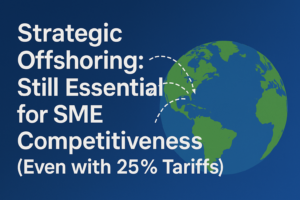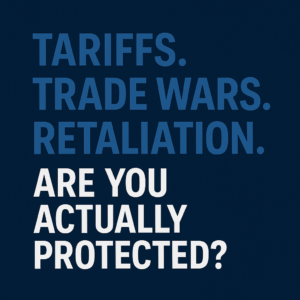
Current News:
“Global tariffs continue to shift as trade tensions simmer. Reuters reports that manufacturers are re-evaluating their supply chains to mitigate sudden cost increases and unpredictable tariffs.”
— Reuters, Reuters – Trade Tensions and Tariffs Update
In today’s unpredictable global market, manufacturing executives face mounting challenges—from volatile tariffs to geopolitical uncertainties. Recent news underscores that relying solely on nearshoring or on-shoring strategies might not yield the competitive edge manufacturers seek. Instead, a managed offshoring strategy is emerging as a robust alternative, capable of swiftly pivoting production among pre-vetted international partners.
Manufacturers with revenues between $20M and $250M are particularly vulnerable to unexpected cost surges and quality variances when switching to domestic suppliers. A growing chorus of industry voices has pointed out that moving subassembly production in-house or to less specialized domestic contractors can jeopardize both quality and pricing competitiveness. Analysts from Bloomberg and the Wall Street Journal alike note that a sole focus on domestic production exposes companies to retaliatory tariffs and supply chain bottlenecks that can erode EBITDA.
Enter REDUxEngineering. With an extensive network of reliable, pre-qualified contract manufacturers spread across multiple global locations, REDUxEngineering offers a fully managed offshoring solution that can neutralize these risks. By leveraging their expertise in global sourcing and logistics management, manufacturers can transform disruptive geopolitical winds into strategic advantages. Their approach not only mitigates the dangers of both nearshoring and on-shoring but also ensures continuous production agility, improved quality control, and competitive pricing.
Key benefits highlighted include:
- Agility in Production: The ability to shift production rapidly across borders minimizes risk and ensures continuity.
- Cost Efficiency: By avoiding the pitfalls of localized tariffs and suboptimal quality from domestic-only sources, companies can protect and even boost EBITDA.
- Quality Assurance: Pre-vetted partners guarantee that product quality remains consistently high, reducing the risks associated with sudden production changes.
Industry experts have recently pointed out that a balanced approach—one that incorporates offshoring managed by a centralized partner—is critical in today’s competitive market. With REDUxEngineering’s solutions, manufacturers gain not just a service provider but a strategic ally, one that offers both expertise and flexibility. In an era where news headlines warn of mounting global pressures, embracing a managed offshoring strategy could be the key to future-proofing your business.
As companies increasingly pivot to this model, the conversation is shifting from reactive risk management to proactive value creation. REDUxEngineering’s service model embodies this shift, offering a seamless integration of cost savings, quality improvement, and operational resilience.
#Manufacturing #Offshoring #GlobalSupplyChain #Tariffs #ManufacturingInnovation #BusinessStrategy #OperationalExcellence #QualityControl #SupplyChainResilience #GlobalTrade #ManagedOffshoring #ManufacturingNews #IndustrialTrends #Efficiency #CompetitiveAdvantage #ManufacturingGrowth #GlobalManufacturing #SupplyChainManagement #ProductionAgility #CostEfficiency #ManufacturingStrategy #BusinessConsultation #IndustrialSolutions #TradeTensions #EconomicOutlook #ReutersNews #MarketTrends #ManufacturingUpdate #ExecutiveInsights #IndustryLeaders #Innovation






